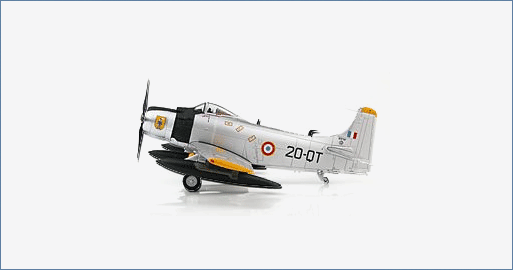Air Power Series>1:72 die-cast display model>A-1>HA2916
AD-4 Skyraiders EC 2/20 "OUARSENIS", Algeria, Early 1960s

General Background
The A-1 Skyraider originated as a carrier-based torpedo and dive bomber. Deliveries as the AD-1 to the Navy began in November 1946 and in 1962 was renamed A-1. It was the first single-seat torpedo/dive bomber to serve with the Navy. The primary mission of the A-1 was close air support for ground troops because of its heavy ordnance load and accuracy. The aircraft had great success in Korea and Vietnam. There were 3,180 Skyraiders built in seven major models and 28 different versions. There were 266 A-1s lost in Vietnam.
Some nicknames - Able Dog, Spad, Sandy, Hobo, Firefly, Zorro and "Crazy Water Buffalo," a VNAF nickname.
Some nicknames - Able Dog, Spad, Sandy, Hobo, Firefly, Zorro and "Crazy Water Buffalo," a VNAF nickname.
The Aircraft
In 1959 using the US Military Assistance Program the Armee de l'Air (AA, the French Air Force)
was able to obtain ninety three used USN Skyraiders made up of AD-4N, AD-4NA and a few
AD-4. The purpose of this acquisition was combat insurgents in Algeria, a French colony until
1962. In 1965 some of these Skyraiders were sent to Cambodia. Skyraider F-TFQT code 20-QT
was delivered on September 8, 1961. In 1963 20-QT was sent to EAA 601 (Air Force warehouse)
Chateaudun AB and withdrawn from use.
Specifications :
| Dimensions | |
| Length: | 39 ft 3 in |
| Height: | 15 ft 8 in |
| Wingspan: | 50 ft 1/4 in |
| Wing area: | 400.33 sq ft |
| Weight | |
| Empty Weight: | 12,070 lbs |
| Normal Loaded: | 18,400 lbs |
| Maximum Weight: | 24,000 lbs |
| Performance | |
| Engine: | (1) 2,500 hp Wright R-3350-26WA Duplex Cyclone 18-cylinder air-cooled radial, rated at 2,600 hp for takeoff and 2,100 hp at 14,000 feet. |
| Max. Speed: | 342 mph at 15,400 ft |
| 319 mph at sea level | |
| Cruising Speed: | 180 mph |
| Combat Ceiling: | 29,400 ft |
| Combat Radius: | 275 miles with 2,000 lbs of bombs |
| Maximum Ferry Range: | 3,240 miles |
| Armament: | (4) 20-mm cannon in the wing |
| (6) Racks underneath each outer wing | |
| (1) Pylon under each inner wing | |
| (1) Pylon underneath the fuselage centerline |

